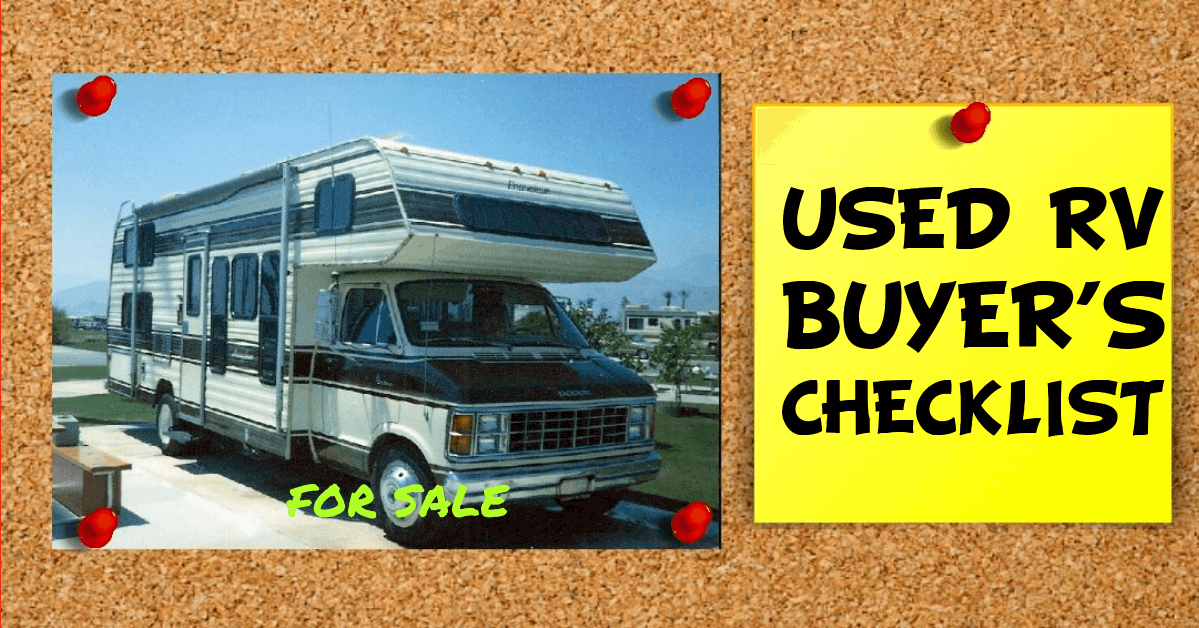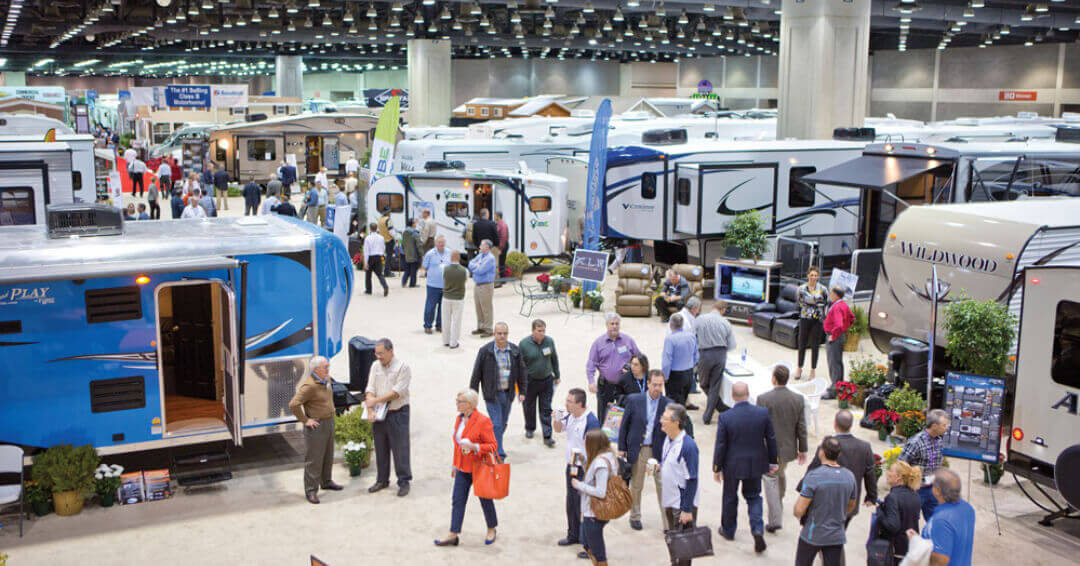- Home Page
- Buying an RV Made Easy
- Used Rv
Used RV Buyer’s Checklist
Used RV Buyer’s Checklist
By: Ross Hinton
This used RV buyer's checklist will walk you through all the items you need to inspect before buying a used RV
Whether you are buying a used RV from a private party, auction or from a reputable dealer, you still have to take great care and spend a long time meticulously checking out all aspects of the RV. After all, this purchase could be one of the largest in your life second only to buying your house. Don´t let yourself get rushed into anything and take your time making notes as you go. Anything that needs attention or replacing should be written down (there will always be something) and the cost of the repairs needs to be considered when negotiating the final price.
Take a reputable mechanic with you to look over the mechanical side of the vehicle, preferably one who is experienced in RVs.
Here are some general points that you should look out for.
- Brakes: The brakes should be tested thoroughly on the test drive, making sure that they are responsive and bearing in mind that when fully loaded the vehicle will be even more difficult to stop. Check the handbrake will hold the vehicle well too.
- Rust: Make sure that the frame of the vehicle is not rusted as this is a sure sign that the motorhome is nearing the end of its life. Occasional small rust spots on certain parts of the bodywork might be possible to repair without presenting further problems but beware of bubbling under the paint work as this signifies rust that has been painted over. At the first sign of rust, you need to discover the extent of the damage and ask yourself how much work is involved in repairing it taking into consideration any paintwork that might need to be done at the same time.
- Paperwork: Ask to see as much of the paperwork as you can including the full-service history along with receipts for any other work that might have been undertaken. Look for the number of previous owners and most important of all make sure that the VIN number of the vehicle itself matches that on the accompanying paperwork. Find out how much weight the vehicle can carry. There should be a notice inside (normally on the back of a wardrobe door) stating the net carrying capacity. This is the maximum weight the RV can carry. This is known as the CCC. There are many models that are so heavy in themselves that they leave very little margin for anything else and once loaded up with your family and their possessions there is a serious danger of overloading the vehicle.
- House batteries: The house batteries provide current for all the internal electrical systems when an external hook-up is not available. You need to discover if these are holding their charge. Check the battery terminals for corrosion. If the vehicle has solar panels fitted you need to discover exactly how much charge is being put back into the batteries.
Good Sam members enjoy instant discounts on fuel. Join Today!
- Propane system: Inspect the propane tanks, hoses, and regulators. There might even be certificates of safety for these. Make sure that the refrigerator switches over from gas to electric with no problems when an external hook up is connected.
- Toilet: The toilet needs to be able to hold water or the smell from the black water tanks will come back up into the bathroom.
- Flooring: Check over the floors very carefully, especially around the sink and in the bathroom. Make sure there are no soft spots. Any damp or mold could lead to rotting of the wood or rusting of metal. Soft spots will most likely be as a result of a leaky plumbing system.
- Ceilings: As with the floors you need to check thoroughly for signs of damp or mold. This will most likely start to appear in hidden places, up the corners and at the back of the lockers. Any damp patches on the ceiling are more than likely a sign that the roof is leaking. A leaky roof can be extremely difficult and expensive to repair.
- Heating: Test out the heating system well, making sure that there is enough power to heat all parts of the motorhome at once. Make sure that there are heating vents in all the rooms including that bathroom and that when on they blow enough hot air to keep the whole vehicle warm on a cold night as well as providing hot water.
- Air conditioning: As with the heating, make sure that this is adequate and that it still blows cold air. Recharging an air conditioning unit can be quite costly.
- Insulation: Ask about insulation. How will it stand up to the cold nights? Are the water tanks insulated?
- Comfort: Spend some time sitting in the chairs and lying on the bed. You need to know if these are comfortable and positioned correctly. Can you lie on the bed without your feet hanging off the end? Can you watch the TV from the chairs without straining your neck? Is there enough room to eat comfortably at the table? Are there enough stove burners? Is the kitchen counter space adequate?
- Overall check: Finally, make sure you do a thorough general check of everything. This includes turning on and off everything you can. Make sure that all the lights are working, both inside and outside. Open every cupboard and locker, check all electric items and the electrical outlets. Are the electrical outlets located in sensible conditions and are there enough of them? Open every door, every vent, every window, and panel, both inside and out.
- Insurance: Just before you make your purchase you should check that you are able to insure the vehicle by contacting a specialist RV insurance company.
About The Author
Author Ross Hinton is an experienced web content contributor.
FAQ
What is the purpose of the "Used RV Buyer’s Checklist"?
What is the purpose of the "Used RV Buyer’s Checklist"?
The "Used RV Buyer’s Checklist" is designed to guide individuals through items they need to inspect before purchasing a used RV.
What precautions should one take when buying a used RV?
What precautions should one take when buying a used RV?
When buying a used RV, one should take their time, make notes of potential issues, consider the costs of repairs when negotiating the price, and preferably take a reputable mechanic with them, especially one familiar with RVs.
How can one determine if the brakes of the RV are in good condition?
How can one determine if the brakes of the RV are in good condition?
The brakes should be thoroughly tested on a test drive to ensure responsiveness, especially considering the vehicle's weight when fully loaded. Additionally, one should check if the handbrake effectively holds the vehicle.
What should one check in terms of the RV's paperwork?
What should one check in terms of the RV's paperwork?
It's essential to review as much of the RV's paperwork as possible, including its full-service history and receipts for any other work done. Ensure the VIN number on the vehicle matches that on the paperwork and verify the RV's net carrying capacity (known as the CCC).
How can one assess the quality of the RV's insulation?
How can one assess the quality of the RV's insulation?
One should inquire about the RV's insulation quality, determining how it performs during cold nights and whether the water tanks are insulated.
Return To The RV Lifestyle Articles Page From The Used RV Buyer’s Checklist Page




